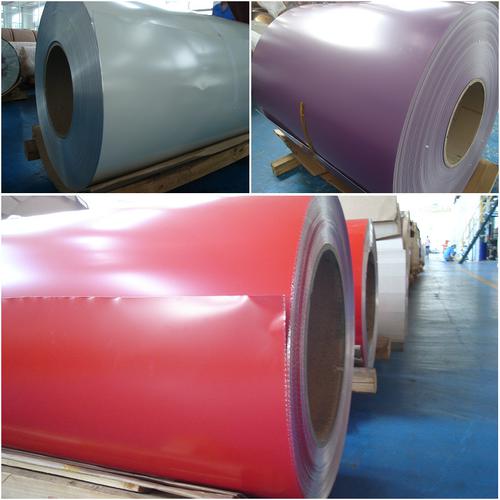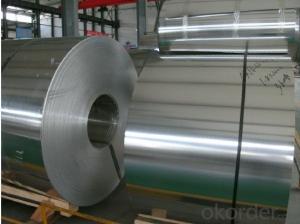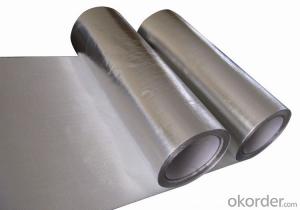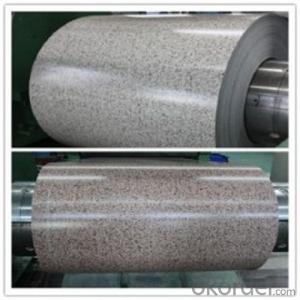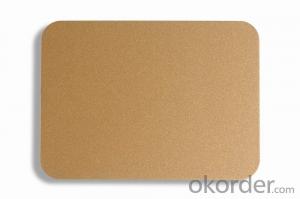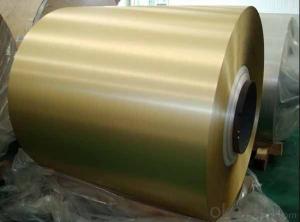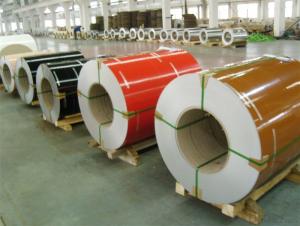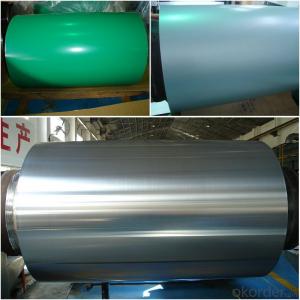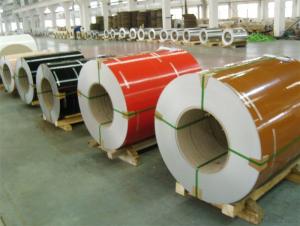Bleach Water Aluminum Coils with PVDF and PE Color Coating
- Loading Port:
- Shekou
- Payment Terms:
- TT OR LC
- Min Order Qty:
- 5 kg
- Supply Capability:
- 200 kg/month
OKorder Service Pledge
OKorder Financial Service
You Might Also Like
1.Structure of PVDF Aluminum Coil for ACP Description
PVDF coated aluminum coils are specially processed through the technics of roller coating and baking with precise paints from BECKER INDUSTRIAL COATINGS in Sweden and THE VALSPAR CORPORATION in USA. The main material of PVDF is polyvinylidene fluoride resin; the utmost negative characteristic of the Fl atom can form a very strength high powerful Fl-C bond. Moreover, with the special symmetry molecule structure, the products are of strong weather resistance performance, anti-ultraviolet performance, super long durability and anti-corrosion performance, which can maintain very bright and glossy color even serving for 20 years in outdoor environment. Attributing to the abrasion resistance and impact resistance and flexibility, our products are of excellent mechanical processing performance.
PVDF coated aluminum coils are the highest priority of choice to high class aluminum composite panels, and its composite products are widely used in airport, exhibition center, administration center, star hotel and other symbol building.
2.Main Features of the Aluminum PVDF Coated Coil:
• Light Weight
• High Flatness
• Protecting Environment
• Good Weathering
• Colorful
• Recycling
• Saving Energy
• Rustproof
3.Aluminum PVDF Coated Coil Images:
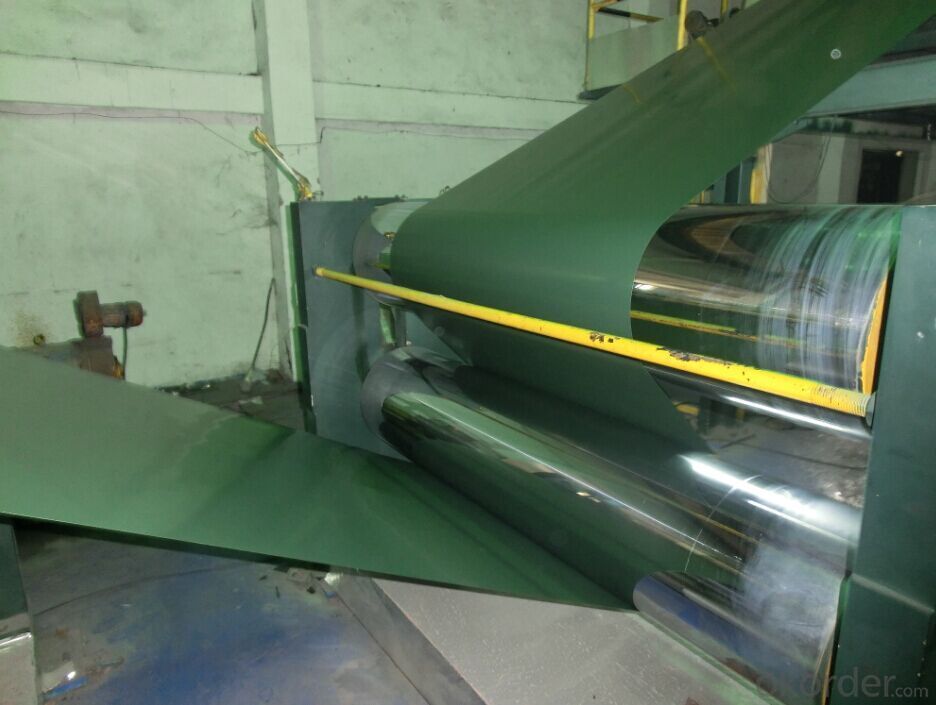
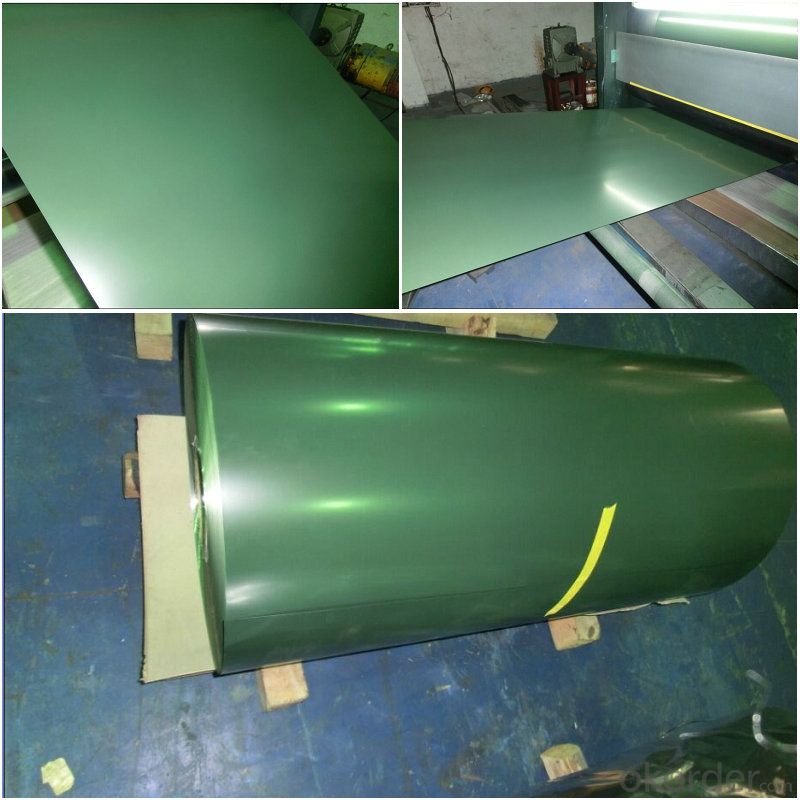
4.Aluminum PVDF Coated Coil Specification:
Aluminum Thickness | Coating Thickness | MEK | T Bend | Impact | Adhesion | Pencil Hardness | Boiling Water Proof |
0.3-1.5mm | ≥25μm | ≥100 Times | ≤2T | 50kg•cm No falling.No crack | 0 Grade | ≥1H | no change within 2 hours |
0.15-0.28mm | ≥25μm | ≥100 Times | ≤2T | 20kg•cm No falling.No crack | 0 Grade | ≥1H | no change within 2 hours |
PVDF Aluminum Coil for ACP
Features of PVDF Aluminum Coil:
1. Adopting precision rolling coating technology, our PE coated coil can ensure excellent adhesive without coating omission.
2. For the PVDF coated aluminum sheet we produced, there are various colors for your choice.
3. Using infrared heating technology to protect environment from pollution.
4. Our coated aluminum coil has four-roller coating line, uniform coating thickness and good features.
Raw Material of the PVDF Coated Aluminum Coil:
1. Aluminum Coil: high strength aluminum with alloy of AA1100 (aluminum alloy is available with AA3003, AA3005, AA5005 according to customer)
2. Surface Paint: PE, PVDF and special paints.
Specification of the PVDF Coated Aluminum Coil:
Width: 20mm~1590mm
Thickness: 0.06mm~1.0mm
External Diameter: ≤ 1500mm
Internal Diameter: 405mm, 505mm, 150mm, 75mm
Coil weight: ≤ 4000kg
5.FAQ
1. Color of Card
Our PVDF coated aluminum coil is made of fluorine carbon resin, pigment, ester solvent after high temperature roasting and baking. The paint of this PVDF coated aluminum coils are solidified to dry film with super weather resistance. PVDF coating also can be classified as traditional PVDF and nanometer PVDF coating.
A. Traditional PVDF Coating, with KYNAR500 PVDF and two or three times for coating and baking, has good properties of anti-acid, anti-alkali and is durable in atrocious weather and environment, keeping 15 years no unwonted fading. In view of these facts, we recommend this PVDF coated aluminum coils are applied for external wall cladding.
B. Nanometer PVDF Coating, which different with traditional PVDF, is the clear coating. It contains nanometer element, which can protect panel from pollution, because nanometer has self-cleaning effect, it is easy to get rid of dust and pollution by raining or water.
2. Color Match
For custom' color requests, we can deal as following:
1. Supply a physical sample of custom color. A color sample on metal is preferred. If other, it is also acceptable. But the color matching rate may be not good as color on metal.
2. New color sample is usually offered by our paint supplier in 5-7 days, special color should be in 7-10 days.
3. Upon receipt of color sample, please approve in writing as soon as possible. Once you approved, we will arrange purchasing and production.
Note: Color difference maybe occurred in different production batch, so it is suggested all panels are placed in one order for same project. And keep same direction as arrow on protective film when installing to avoid any color difference by vision.
3.How long can we receive the product after purchase?
15-20days for general specification and 35days for special specification after receiving the deposit.
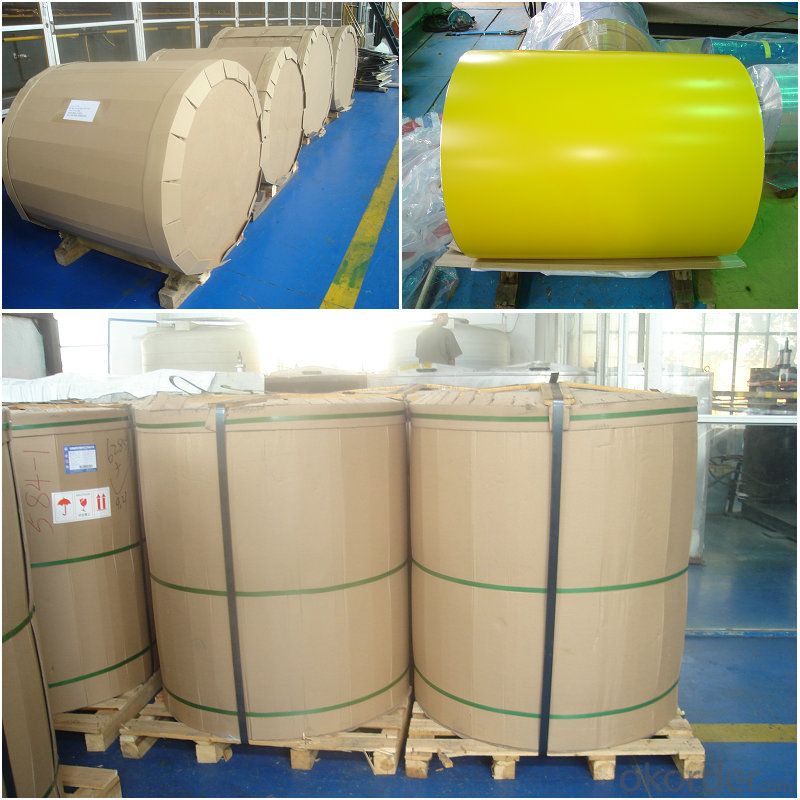
- Q: This question asks about the economic impact of aluminum coils, which are a key material in various industries.
- <p>Aluminum coils significantly impact the economy by driving growth in various sectors. They are vital in construction, automotive, aerospace, and packaging industries due to their lightweight, durability, and recyclability. The aluminum coil market stimulates manufacturing, job creation, and technological advancements. Additionally, their high demand supports the growth of the aluminum industry, influencing trade and contributing to GDP. The recycling of aluminum coils also reduces energy consumption and environmental impact, further benefiting the economy by promoting sustainable practices.</p>
- Q: Are there any health or safety concerns related to aluminum coils?
- Aluminum coils have the potential to present health and safety risks, particularly in certain situations. One concern is the possibility of aluminum particles or fumes being released into the air, especially during the manufacturing or processing of the coils. Inhaling these particles or fumes could result in respiratory problems or lung damage. Moreover, damaged or corroded aluminum coils might release aluminum ions into food or drinks, which could be harmful if consumed excessively. Nonetheless, it is worth noting that the risks associated with aluminum coils are generally minimal and can be reduced through proper handling and upkeep. Manufacturers typically implement various safety measures to prevent the release of aluminum particles or fumes during production. Additionally, aluminum coils used in heating, ventilation, and air conditioning systems are usually coated or treated to prevent corrosion and the subsequent leaching of aluminum ions. To minimize any potential health risks, it is advisable to adhere to safety guidelines provided by manufacturers. This may involve wearing appropriate protective gear when handling aluminum coils and ensuring adequate ventilation in areas where they are processed or installed. Regular inspection, cleaning, and maintenance of the coils can also help identify and resolve any potential issues before they become a matter of health or safety. In conclusion, although there are concerns regarding the health and safety implications of aluminum coils, these risks can be managed through proper handling, maintenance, and adherence to safety guidelines. Seeking advice and recommendations from professionals or manufacturers regarding the utilization and upkeep of aluminum coils is always recommended to ensure maximum safety.
- Q: Can aluminum coils be used in the production of aluminum gutters?
- Yes, aluminum coils can be used in the production of aluminum gutters. Aluminum coils are commonly used in the manufacturing process of aluminum gutters. These coils are made from aluminum alloy, which is a lightweight and durable material. The coils are shaped and formed into the desired gutter profile using specialized machinery. The use of aluminum coils allows for efficient and precise production of gutters, ensuring a high-quality end product. Additionally, aluminum is corrosion-resistant, making it an ideal material for gutters, as it can withstand exposure to weather elements such as rain and snow. Overall, aluminum coils are a suitable choice for the production of aluminum gutters due to their strength, durability, and resistance to corrosion.
- Q: im doing this essay in my chemistry class that suppose to be a ficional story about the day my element, aluminum, slowly began disappearing.i know some things that will happen like no soda cans of anything of that, no foil no forks or spoons anything metally. i need more effects that will happen but my major problem is how to start this. i have no clue like how to begin.can anyone help pleased.!
- In addition to goods like aluminum foil and cans, you would have to face the disappearance of certain gems. Look up the composition of rubies and emeralds. Also look up the composition of aluminum silicate minerals generally. Would a large amount of the planet disappear from under us? What % composition of the Earth is Al?
- Q: This question asks whether aluminum coils are produced using recycled materials.
- <p>Yes, aluminum coils can be made from recycled materials. Recycling aluminum is a common practice because it conserves resources and energy. Recycled aluminum, also known as secondary aluminum, is processed from various waste materials such as used beverage cans, automotive parts, and construction materials. The recycling process involves melting the scrap aluminum, which requires significantly less energy compared to producing aluminum from raw materials. This makes the production of aluminum coils from recycled materials more sustainable and environmentally friendly.</p>
- Q: What are the different pre-treatment methods for aluminum coils?
- Some of the different pre-treatment methods for aluminum coils include cleaning, degreasing, etching, and phosphating. Cleaning removes dirt, dust, and other impurities from the surface of the coil. Degreasing eliminates oils and greases that may be present. Etching creates a rough surface on the aluminum, which helps in improving adhesion for subsequent coatings. Phosphating involves applying a phosphate coating to enhance corrosion resistance and improve paint adhesion. These pre-treatment methods ensure that the aluminum coils are properly prepared before any further processing or coating.
- Q: wikipedia says welding aluminum by means of stick welding is possible but i have always been told TIG is the only way to weld aluminum. what do i need in order to stick weld aluminum? BTW i have a Lincoln Electric AC 225 Stick Welder
- You can buy aluminum welding rods for stick welding aluminum but it is hard to weld on thicknesses less than 3/16 of an inch with stick without practice. TIG is your best bet on lighter material. You also have to match the rods to the same alloy of aluminum base material you are welding.
- Q: Can aluminum coils be used in extreme temperature conditions?
- Yes, aluminum coils can be used in extreme temperature conditions. Aluminum has a high thermal conductivity and is resistant to corrosion, making it suitable for various temperature extremes. Additionally, aluminum's low melting point allows it to withstand high temperatures without deforming or losing its structural integrity.
- Q: Can aluminum coils be used for automotive body panels?
- Yes, aluminum coils can be used for automotive body panels. In fact, aluminum is a popular choice for car manufacturers due to its lightweight and corrosion-resistant properties, leading to improved fuel efficiency and longevity of the vehicle.
- Q: Which is more unhealthy the bleached parchment paper or the aluminum from the pan?
- Parchment paper is siliconized and the aluminum is stabalized. Based on that choice you're not any more or less safer with either or both.
Send your message to us
Bleach Water Aluminum Coils with PVDF and PE Color Coating
- Loading Port:
- Shekou
- Payment Terms:
- TT OR LC
- Min Order Qty:
- 5 kg
- Supply Capability:
- 200 kg/month
OKorder Service Pledge
OKorder Financial Service
Similar products
Hot products
Hot Searches
Related keywords

